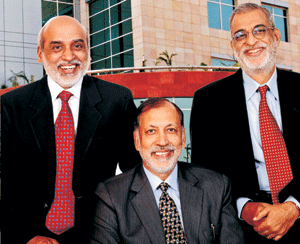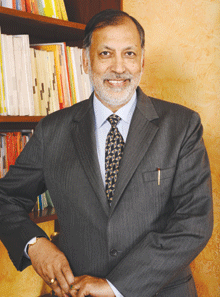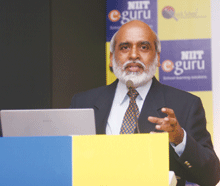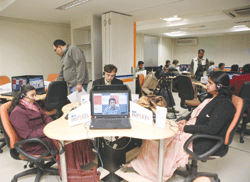With the state-of-the-art NIIT University assuming shape and form on a 100 acre campus in the fortress town of Neemrana, Rajasthan, this Delhi/Gurgaon-based company is now a broad spectrum multinational with a significant presence in school, vocational and higher education in India and abroad. Dilip Thakore reports
 There’s a discernible buzz of excitement these days in the executive suites in Delhi and suburban Gurgaon, of India’s market leader ICT communications technology)-driven education services behemoth NIIT Ltd (sales revenue: Rs.1,000.68 crore in the year ended March 31, 2008). Hitherto classified as a provider of short-term IT (information technology) training programs in India and abroad, NIIT has realigned its corporate compass and positioned itself as “Asia’s No1. IT training company and leading global talent development corporation”.
There’s a discernible buzz of excitement these days in the executive suites in Delhi and suburban Gurgaon, of India’s market leader ICT communications technology)-driven education services behemoth NIIT Ltd (sales revenue: Rs.1,000.68 crore in the year ended March 31, 2008). Hitherto classified as a provider of short-term IT (information technology) training programs in India and abroad, NIIT has realigned its corporate compass and positioned itself as “Asia’s No1. IT training company and leading global talent development corporation”.
And the latest cause of the flurry of excitement in the executive suite — if not quite in the remainder of the company’s four storey 45,000 sq. ft. head office in Gurgaon which hosts 10 percent of NIIT’s 3,850 employees around the world — is imminent completion of the first phase of construction of a state-of-the-art NIIT University, which is assuming shape and form on a 100 acre campus in the fortress town of Neemrana, Rajasthan (pop.56 million). NIIT University is being rapidly readied to admit its first batch of 450 B.Tech, M.Tech and Ph D students in September.
The brain-child and labour of love of Rajendra Pawar, the company’s suave IIT-Delhi-educated promoter-chairman, no pains or expense are being spared to build NIIT University into a globally benchmarked multi-disciplinary insti-tution, which will set new higher education standards in India. Concep-tualised and promoted by the founder-directors of NIIT Ltd (estb.1981) and established under the government of Rajasthan’s education department guidelines for the establishment of private universities dated 26.07.2007, the carefully-designed varsity campus has been master-planned by YRM (London) Ltd, a globally renowned campus architecture firm which has also designed campuses of Brunel (London) and Cyprus universities.
Moreover the university’s founding advisory board members comprise a galaxy of proven former directors of India’s most renowned institutions of higher education, including Prof. P.V. Indiresan (former director of IIT-Madras), Dr. R.A. Mashelkar (former director general of the Council for Scientific & Industrial Research — CSIR), Prof. R.C. Malhotra (former director IIT-Kanpur), Prof. C.S. Jha (former director IIT-Kharagpur) and Prof. Ashok Misra (former director IIT-Bombay).
 "NIIT University will deliver globally benchmarked, industry-linked degree programmes using proven technology, and create a research culture on campus from day one. This university whose idea was seeded in the 1990s and includes the vision, mission and core principles of the high-powered founding board of advisors, is designed to shape leaders of the emerging knowledge economy,” says Pawar who has handpicked Prof. M.P. Kapoor, former vice-chancellor of Thapar University, as project director and founder vice-chancellor of the university, while he himself will assume the office of pro chancellor. (see box).
"NIIT University will deliver globally benchmarked, industry-linked degree programmes using proven technology, and create a research culture on campus from day one. This university whose idea was seeded in the 1990s and includes the vision, mission and core principles of the high-powered founding board of advisors, is designed to shape leaders of the emerging knowledge economy,” says Pawar who has handpicked Prof. M.P. Kapoor, former vice-chancellor of Thapar University, as project director and founder vice-chancellor of the university, while he himself will assume the office of pro chancellor. (see box).
Now a broad-spectrum education multinational with a significant presence in school, vocational and higher education in India and abroad, NIIT has come a long way since it was modestly promoted by Pawar with his IIT-Delhi batch mates, Vijay Thadani (currently chief executive) and P. Rajendran (chief operating officer) in 1981, to train unemployed graduates to use the then-new wonder office productivity machine — the personal computer. Over the past 28 years this erstwhile computer training institute has metamorphosed into an education services heavyweight providing integrated solutions for computer-aided education to 7,800 government and 1,200 private schools; instructor-led training, computer-based training and e-learning programs to 500,000 individuals (per year) in India and abroad; corporate sponsored training to 3 million executives, and specialised training to 10,000 banking and finance professionals.
Most strikingly NIIT which has 3,850 employees worldwide, delivers the study programs and services enumerated above, not only in India but in six continents including the Americas (USA, Canada, Mexico, Peru, El Salvador, Nicaragua, Honduras); Europe (Greece, Italy, Kazakhstan, UK and Serbia); Asia (Bangladesh, Cambodia, China, Indonesia, Malaysia, Nepal, Singapore, Sri Lanka, Thailand, Turkey and Vietnam), and Africa (Botswana, Ghana, Libya, Nigeria, Senegal, Sudan, South Africa and Zimbabwe), with its client list boasting Fortune 100 companies such as Allstate Insurance, Cisco, Ford, GE, Microsoft and Walmart.
Moreover this globe-girdling corporation is especially active in the neighbouring People’s Republic of China, where it has established 192 owned and franchised NIIT Learning Centres in 24 provinces. These centres offer Mandarin-language computer training and English learning programs to “millions of students” in that country. Indeed in the near three decades since the company began its operations in a modest office in downtown Delhi, it has transformed into a genuine multinational with 60 percent of its annual revenues contributed by overseas operations.
 “The prime factor behind the success of NIIT is that we constantly assess the existing and future learning needs of individuals and business enterprises and act to fulfil them. With this service philosophy, the company has developed three core competencies — pedagogy development, technology usage and global reach. As a result, today NIIT manages the largest content development program worldwide offering 6,500 learning programs constantly updated and augmented by a research and development division of 1,400 people, and an e-library of over 300,000 pages. These learning programs are delivered around the world using state-of the-art information and communication technologies to guarantee high quality, standardised learning outcomes. Moreover it is NIIT policy to go out as far as it takes, to reach for subject expertise and customers. The successful development of these core competencies has prompted us to re-position the company as a global talent development corporation,” says Vijay K. Thadani, an electrical engineering graduate of IIT-Delhi who began his career in NELCO (1972-74), and KELTRON (1974-81), prior to co-promoting Pace Education Pvt Ltd (later renamed the National Institute of Information Technology which morphed into NIIT Ltd) to “bring computers and people together successfully”.
“The prime factor behind the success of NIIT is that we constantly assess the existing and future learning needs of individuals and business enterprises and act to fulfil them. With this service philosophy, the company has developed three core competencies — pedagogy development, technology usage and global reach. As a result, today NIIT manages the largest content development program worldwide offering 6,500 learning programs constantly updated and augmented by a research and development division of 1,400 people, and an e-library of over 300,000 pages. These learning programs are delivered around the world using state-of the-art information and communication technologies to guarantee high quality, standardised learning outcomes. Moreover it is NIIT policy to go out as far as it takes, to reach for subject expertise and customers. The successful development of these core competencies has prompted us to re-position the company as a global talent development corporation,” says Vijay K. Thadani, an electrical engineering graduate of IIT-Delhi who began his career in NELCO (1972-74), and KELTRON (1974-81), prior to co-promoting Pace Education Pvt Ltd (later renamed the National Institute of Information Technology which morphed into NIIT Ltd) to “bring computers and people together successfully”.
This simple and socially beneficial objective of the three co-promoters of NIIT has been attained beyond their wildest dreams. Over the past 28 years the company has provided computer familiarisation and training to a massive 16 million individuals — a number equivalent to 33 percent of the total organised sector work force of India. As such it has played a major role in not only demystifying computers and computerisation, but has also played an enabling role in the massive productivity leap of the Indian economy, which has been hauled out of the rut of the so-called Hindu rate of growth (3.5 percent per year) during the two decades past. It is pertinent to recall that India’s GDP growth accelerated to 5 percent per annum in the mid 1980s — at a time when NIIT (with other IT training companies such as Aptech, IIHT, Jetking and New Horizons) began to get into its stride.
Moreover in its steady and uninterrupted evolution into an education services transnational, the company has sign-posted several landmark achievements. Among them: it pioneered the delivery of short-term computer and IT training programs in India (1981); initiated use of multimedia technology in education (1982); introduced the franchise model for IT education (1987); launched its best-selling GNIIT industry-endorsed program to ready individuals for careers in the booming IT industry (1992); launched Netvarsity, its first virtual university (1996); innovated the hole-in-the wall personal computer experiment (1999) for poor children (the inspiration behind Q&A, the novel which translated into the Oscar-winning movie Slumdog Millionaire); and launched the NIIT-Inside model to deliver computer and English language training to students in China (2004).
 Developing, commercialising and marketing the company’s 6,500 learning courses patronised by 485,000 young adults on any given day; managing 8,703 education centres worldwide; creating ICT-enabled content and wired classrooms for 3.8 million children and 300,000 corporate personnel and mining markets in 40 countries around the world isn’t possible without highly trained and skilled employees delivering the teaching-learning services for which this Delhi/Gurgaon company has become famous internationally. “The NIIT growth story is based on the core belief that our growth is the derivative of the growth of each one of us. Therefore the training and development of NIITians — as we term all our 3,850 employees worldwide — begins right from the induction and orientation stage and continues in all growth phases of their careers. Right from the inception of the company we established a School for Employee Education and Development, aka SEED within the company, which informs and trains employees on a continuous basis with more than 100 top NIIT executives involved in training sessions and programs. Moreover since we work with 36 of the world’s top IT companies to train their employees to market new products, we attract high-quality talent and retain it by providing customised development programs for each employee, deputing them for external training modules and offering instant appreciation of good performance. Which is why according to several surveys, NIIT is a preferred employer brand of choice,” says P. Rajendran, co-founder of the company and currently chief operating officer, with special responsibility for nurturing NIIT’s valuable human resource pool.
Developing, commercialising and marketing the company’s 6,500 learning courses patronised by 485,000 young adults on any given day; managing 8,703 education centres worldwide; creating ICT-enabled content and wired classrooms for 3.8 million children and 300,000 corporate personnel and mining markets in 40 countries around the world isn’t possible without highly trained and skilled employees delivering the teaching-learning services for which this Delhi/Gurgaon company has become famous internationally. “The NIIT growth story is based on the core belief that our growth is the derivative of the growth of each one of us. Therefore the training and development of NIITians — as we term all our 3,850 employees worldwide — begins right from the induction and orientation stage and continues in all growth phases of their careers. Right from the inception of the company we established a School for Employee Education and Development, aka SEED within the company, which informs and trains employees on a continuous basis with more than 100 top NIIT executives involved in training sessions and programs. Moreover since we work with 36 of the world’s top IT companies to train their employees to market new products, we attract high-quality talent and retain it by providing customised development programs for each employee, deputing them for external training modules and offering instant appreciation of good performance. Which is why according to several surveys, NIIT is a preferred employer brand of choice,” says P. Rajendran, co-founder of the company and currently chief operating officer, with special responsibility for nurturing NIIT’s valuable human resource pool.
The high-quality education services provided by the company’s human resources is evidenced by the steady expansion of its school learning solutions division which provides ICT-driven integrated supplementary learning programs to government and private schools. Currently this division offers computer training and curriculum-mapped multimedia learning services to 7,800 government primary/secondary and 1,200 private K-12 schools in 15 states across the country.
 Since starting its operations in 1999, this division of the company has earned plaudits for several path-breaking innovations which have eased the administrative load of school principals and staff, while coterminously raising teaching-learning standards and improving learning outcomes in 9,000 schools countrywide with an aggregate enrolment of 8 lakh students. Among them: a shared computing solution which the division provides to govern-ment schools following a collaboration agreement with NComputing, a US-based company; the eGURU integrated ICT-driven holistic education software package for private schools which includes Interactive Classrooms for teachers, Math Lab and IT Wizard for students; Quick School, an education resource planning solution designed to reduce the workload of school administrators; promotion of the NIIT Mind Champion Academy (estb. 2002) — a joint initiative between world chess champion Vishwanathan Anand and the company, which has already attracted a membership of 750,000 students and fostered 6,351 chess clubs countrywide.
Since starting its operations in 1999, this division of the company has earned plaudits for several path-breaking innovations which have eased the administrative load of school principals and staff, while coterminously raising teaching-learning standards and improving learning outcomes in 9,000 schools countrywide with an aggregate enrolment of 8 lakh students. Among them: a shared computing solution which the division provides to govern-ment schools following a collaboration agreement with NComputing, a US-based company; the eGURU integrated ICT-driven holistic education software package for private schools which includes Interactive Classrooms for teachers, Math Lab and IT Wizard for students; Quick School, an education resource planning solution designed to reduce the workload of school administrators; promotion of the NIIT Mind Champion Academy (estb. 2002) — a joint initiative between world chess champion Vishwanathan Anand and the company, which has already attracted a membership of 750,000 students and fostered 6,351 chess clubs countrywide.
 “NIIT pioneered the integration of ICT in schools more than a decade ago. The distinguishing feature of our business model is that we provide customised learning solutions after deep study of market and institutional needs. Thus for government schools we have signed a strategic alliance with NComputing, a US-based company to provide shared computer solutions, which cuts costs of computer-aided learning by up to 50 percent. Likewise after ascertaining the needs and pain points of private K-12 schools, we recently launched our integrated NIIT eGuru software package which addresses the needs of all key stakeholders in school education — students, teachers, school managements and parents. This integrated package seamlessly incorporates other software packages such as Interactive Class-rooms for teachers, Math Lab and IT Wizard for students and Quick School which is an education resource planning solution for school managements. Our mission is to continuously introduce products and solutions which will bring back the joy of learning into the lives of students, and the public can expect a stream of new products and solutions from NIIT in the near future,” says L. Balasubramanian, the Chennai-based president of the company’s school learning solutions division.
“NIIT pioneered the integration of ICT in schools more than a decade ago. The distinguishing feature of our business model is that we provide customised learning solutions after deep study of market and institutional needs. Thus for government schools we have signed a strategic alliance with NComputing, a US-based company to provide shared computer solutions, which cuts costs of computer-aided learning by up to 50 percent. Likewise after ascertaining the needs and pain points of private K-12 schools, we recently launched our integrated NIIT eGuru software package which addresses the needs of all key stakeholders in school education — students, teachers, school managements and parents. This integrated package seamlessly incorporates other software packages such as Interactive Class-rooms for teachers, Math Lab and IT Wizard for students and Quick School which is an education resource planning solution for school managements. Our mission is to continuously introduce products and solutions which will bring back the joy of learning into the lives of students, and the public can expect a stream of new products and solutions from NIIT in the near future,” says L. Balasubramanian, the Chennai-based president of the company’s school learning solutions division.
 Encouraged by the enthusiastic response in India and abroad to the company’s fast-expanding range of ICT-driven learning products and services — NIIT has established 192 branded learning centres in China and a presence in eight countries across Africa as well. “Expanding our core competencies in education process management and curriculum design into China has been a successful initiative. Over the past 11 years, we have translated our content into Mandarin Chinese and established our NIIT Inside model in 130 universities in China. As a result millions of students in China are enroled in our training programs to learn IT literacy or in advanced development programs. We have also established a strong presence in Nigeria, Ghana and Botswana. We have identified the eight African countries as growth markets,” says G. Raghavan, an alumnus of IIM-Ahmedabad and president of NIIT’s Global Learning Solutions division since 2006.
Encouraged by the enthusiastic response in India and abroad to the company’s fast-expanding range of ICT-driven learning products and services — NIIT has established 192 branded learning centres in China and a presence in eight countries across Africa as well. “Expanding our core competencies in education process management and curriculum design into China has been a successful initiative. Over the past 11 years, we have translated our content into Mandarin Chinese and established our NIIT Inside model in 130 universities in China. As a result millions of students in China are enroled in our training programs to learn IT literacy or in advanced development programs. We have also established a strong presence in Nigeria, Ghana and Botswana. We have identified the eight African countries as growth markets,” says G. Raghavan, an alumnus of IIM-Ahmedabad and president of NIIT’s Global Learning Solutions division since 2006.
Moreover in 2006 the company introduced two new individual learning initiatives which could well spark a productivity revolution within India’s torpid banking and finance and wider corporate sectors. In its very first year, the company’s Institute of Finance, Banking & Insurance (IFBI, estb. 2006), promoted in partnership with eight blue-chip partners, including ICICI Bank, Kotak Mahindra Finance, HDFC Bank among others to “create trained manpower for the emerging new economy”, upskilled 11,000 banking, finance and insurance professionals delivering innovative short-term training programs in 22 centres across the country.
Simultaneously, leveraging its reputation as the country’s largest IT training company, NIIT tied up with six top B-schools (IIM-Ahmedabad, IIM-Calcutta, IIM-Indore, IIM-Lucknow, IIFT, Delhi and IMT, Ghaziabad) to promote its NIIT Imperia division to provide refresher courses and upskilling programs to mid-level and senior executives in Indian industry.
 “The BFSI (banking, financial services and insurance) sector is forecast to experience a shortage of 1.5 million qualified managers by the year 2012. NIIT’s IFBI was promoted to address this looming shortage of trained BFSI professionals within the Indian economy. We provide computer and customer-management training to entry- level professionals, and upskilling education to mid-level and senior professionals. The institute offers five full-time or part-time professional learning programs and has thus far trained 7,500 entry level professionals and re-skilled 10,000 managers,” says Dr. Smarjit Dey, an alum and former professor of BITS, Pilani and currently president of IFBI and NIIT Imperia.
“The BFSI (banking, financial services and insurance) sector is forecast to experience a shortage of 1.5 million qualified managers by the year 2012. NIIT’s IFBI was promoted to address this looming shortage of trained BFSI professionals within the Indian economy. We provide computer and customer-management training to entry- level professionals, and upskilling education to mid-level and senior professionals. The institute offers five full-time or part-time professional learning programs and has thus far trained 7,500 entry level professionals and re-skilled 10,000 managers,” says Dr. Smarjit Dey, an alum and former professor of BITS, Pilani and currently president of IFBI and NIIT Imperia.
Intelligent business environment scanning driven by socially beneficial enlightened self-interest, also prompted the promotion of NIIT Imperia three years ago. Given that every year, of the 300,000 graduates who write the CAT (Common Admission Test) for admission into the country’s seven IIMs, a mere 1,800 are admitted, the NIIT top brass discerned a business opportunity in providing IIM education to the 1 million next-best aspirational graduates, who had to make do with second best B-school education. Therefore in 2006, on the lines of its IFBI model, NIIT top brass persuaded several front-rank B-schools to partner with the company to deliver synchronous distance learning MBA programmes to working professionals.
Under the arrangement with six highly fancied B-schools (enumerated above), business management education is jointly provided by the company and partner B-schools in 22 fully-wired interactive NIIT centres countrywide, with working professionals lectured through broadcasts of the best faculty of partner B-schools. “We have designed 25 two-year executive MBA programmes (price: Rs.50,000-70,000 per year) for professionals with 0-3 years, 6-10 and 10 years-plus experience, and have trained and upskilled 1,800 executives — certified by our partner B-schools — thus far. In the next three years the number will increase to over 10,000,” says Dey.
 With high-end diversifications and the company’s initiatives overseas success-fully transforming its institutional persona from a provider of low-end IT training into a preschool to Ph D education services multinational with countrywide operations in India and 40 countries abroad, it’s hardly surprising that Vijay Thadani, the cerebral and go-getting chief executive of NIIT, has raised the bar to position the company as a global talent development corporation. “For the past century or more, India’s education system has focused on developing manufacturing capability. Now, with the services sector contributing 54 percent of the country’s GDP, we want to be in the forefront of developing service industry capabilities. We believe this can be done by replicating the NIIT experience of preparing 16 million people for the IT industry, in other sectors of the service economy. Moreover we have set our sights beyond India to transform into a global talent development corporation intent upon making the world digitally literate. According to a study conducted by the Boston Consulting Group, by the year 2020 India will have a surplus of 47 million working age people even as there will be a global shortage of 56 million working age people. NIIT aspires to be in the vanguard of educating and skilling Indian youth to emerge as the workers and service providers of the world,” says Thadani.
With high-end diversifications and the company’s initiatives overseas success-fully transforming its institutional persona from a provider of low-end IT training into a preschool to Ph D education services multinational with countrywide operations in India and 40 countries abroad, it’s hardly surprising that Vijay Thadani, the cerebral and go-getting chief executive of NIIT, has raised the bar to position the company as a global talent development corporation. “For the past century or more, India’s education system has focused on developing manufacturing capability. Now, with the services sector contributing 54 percent of the country’s GDP, we want to be in the forefront of developing service industry capabilities. We believe this can be done by replicating the NIIT experience of preparing 16 million people for the IT industry, in other sectors of the service economy. Moreover we have set our sights beyond India to transform into a global talent development corporation intent upon making the world digitally literate. According to a study conducted by the Boston Consulting Group, by the year 2020 India will have a surplus of 47 million working age people even as there will be a global shortage of 56 million working age people. NIIT aspires to be in the vanguard of educating and skilling Indian youth to emerge as the workers and service providers of the world,” says Thadani.
Quite clearly the process of transforming this 28-year-old company, from a computer and IT enterprise into a global talent development corporation working for the greater good of the greatest number, is all set to acquire momentum.